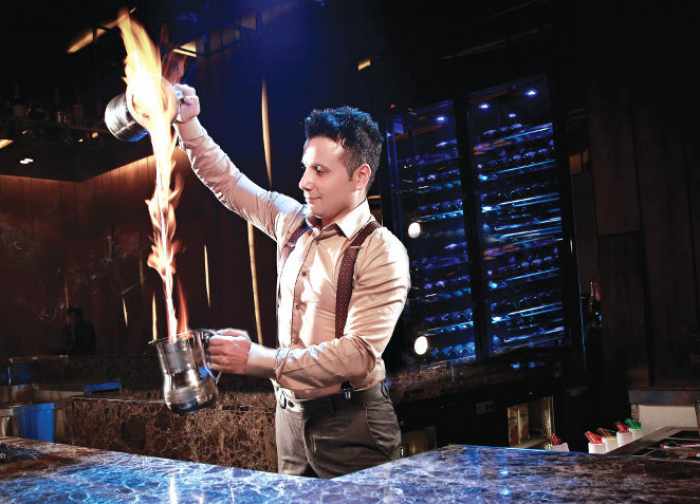Mixologist explains how to keep a smooth flow behind the bar

PHUKET: Many bars and beach clubs in Phuket are tempted by the romance of gastronomic concoctions in the kitchen to bring the same flare to their drink menus as a way to boost profits.
However, for the vast majority of them this isn’t the solution, explains Richard Gillam, a world renowned mixologist and regional on-trade channel manager at Remy Cointreau.
Mr Gillam, during his more than 15 years in almost every position, from bartender to operations manager, at venues ranging from small luxury lounges to 3,000 capacity nightclubs, has seen the full scope of attempts by bar owners to maximize profits.
“Even an average restaurant has a little touch [of gastronomy] here and there, which is great, because they have a little room in the back that’s called a kitchen that’s full of these people called chefs,” Mr Gillam said.
“There is a whole team of them, and they are usually hidden away. And some idiot’s going, ‘Okay, right, let’s do it on the bar.’ Bearing in mind these guys [some bartenders] can hardly make a gin and tonic consistently.”
The issue is that profit margins over a standard cocktail are minimal when compared to the amount of work necessary to creating the gastronomic drinks.
“Sometimes it’s an absolute failure. You have to pay more for it; it’s a lot of work; and if the one guy on the bar who can make it is away, then you can’t sell it.”
Nonetheless, small touches that can be prepared ahead of time and techniques like suspensions, where the beverage is thick, so it can support berries, crispy chocolate balls or gold flakes at the surface, but is still drinkable can help improve the class of a venue.
However, to really boost bar profits during the low season, high season and coup season, Phuket nightlife venue operators need to determine what their top 10 best-selling drinks are, Mr Gillam said.
The best method is not elaborate scientific cocktails sold at prices to match their artistry.
It’s exactly what was done in England when the drinking hours were restricted – they made it a numbers game (and chucked the pool tables).

So back to the list.
“Print out your 10 best-selling drinks. Take all of your bottles, all of your juices [out of the bartending area]. These are your top-selling drinks, these are the ingredients [you need], put them in your speed rail first,” Mr Gillam said. “Everything you use day in and day out.”
The goal is for the bartender not to have to move to make any of these drinks. They don’t have to turn around to find the necessary tumbler or walk over to the fridge to get the limes. All the basics for the drinks sold by the dozens each day are at their fingertips, putting them in customers’ hand minutes faster.
“If you only make five [different] drinks that sell more than 10 drinks a day, I say great. You’ve got extra space [in your speed rail]. Two bottles of rum for your mojitos, two bottles of gin for your gin and tonics.”
With your speed rail set-up properly, the next step is organizing the items you use once a day – those are the ones put behind the bartender. Then the real oddballs, the ones that only hit a glass once a week, can go into the cupboard.
Every minute a customer is waiting on a drink adds to a minute they are not drinking – not by their choosing, but because it’s taken that long for them to be served.
“It’s like a kitchen. You come in and prep everything, and you have it right there. It’s business. It’s all it is.”
— Isaac Stone Simonelli
Latest Thailand News
Follow The Thaiger on Google News:


























